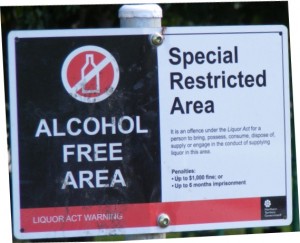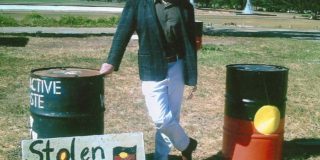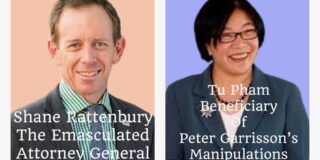There are words like Freedom
Sweet and wonderful to say.
On my heart strings freedom sings
All day everyday.
There are words like Liberty
That almost make me cry.
If you had known what I know
You would know why.
Langston Hughes
(p. 38 of Poetry For Young People: Langston Hughes)
Lectori Salutem of Blak and Black, many will recognise the title of this post as being a famous quote from arguably Rome’s greatest statesman and patriot, Cicero. The quote itself means we are slaves of the law so that we may be able to be free. These are the noble words of a true believer in the ‘rule of law’ however when the rule of law itself becomes Nemo nisi Nomen it simultaneously becomes the chains and shackles of an enslaved people. The Nazi’s proved to the world that once the substance is removed from phrases like ‘the rule of law’ the empty shell that remains can become the tools of oppression, injustice and finally genocide.
To my mind at least, implicit in the phrase ‘rule of law’ are terms such as freedom and liberty. Langston Hughes the man widely regarded as the poet laureate of African American verse penned the aforementioned pithy, socially perceptive and deceptively incisive poem in the 1940s. After reading Hughes’ poem for the first time a few weeks ago and spending some time meditating on its meaning, a meaning in which he distinguishes between freedom and liberty, I realized that these are terms that are worth zeroing in on in this era when more and more of our freedoms are being stripped away from us in the name of national security.
Hughes seems to be suggesting that Liberty is pseudo-freedom, freedom in the form of domination. Liberty itself seems to have become virtually synonymous with “free enterprise” or the “free markets” today, one might say that liberty is the new imperialism; an imperialism that itself has threatened to destroy our very way of life through its greed and corruption leading to the current GFC. Indeed Thomas Jefferson, the third president of the United States and author of the famous Notes on Virginia, described America as an “empire of liberty,” an epithet that Australia seems determined to share.
For Jefferson, the ’empire of liberty,’ is a place where “freedom” in the (ideological) form of liberty would be the inner logic of empire. In Jefferson’s world view, liberty as a specific brand of freedom is what would distinguish the ‘empire of liberty’ from the colonial empires of Europe, where liberty for the colonised as indeed for most citizens is but a dream .For Jefferson and to paraphrase Carl Schmitt, liberty would be the ‘empire of liberty’s’ “state of exception.” Liberty would define American exceptionalism. Liberty would in reality become the inner logic of American political theology. According to this view, the ‘empire of liberty’ would have at its core a singular symbolic truth. Liberty would indeed be the truth (and power) under which, and harking back to Cicero, there would be a “joint community of gods and men.” But, this state of exception did not extend to all Americans. It did not extend to first Americans and it most certainly did not extend to slaves.
Langston Hughes, as indeed many other African Americans before and after him and many Indigenous Australians and other minority groups in Australia would likewise recognize that this vision of America and later Australia is nothing more than a conceit aimed at justifying a way of life. Hughes understood that from its very beginning the ‘empire of liberty’ has pressed its logic negatively into dark bodies, the body of the slave and the body and land of the natives. In the homeland of the “empire of liberty”, the slave plantation and the lynching tree are inseparable. This is what Hughes knows: “if you had known what I know, you would know why I’m almost ready to cry.” Liberty for Hughes is a hierarchical form of freedom. For this reason, Hughes laments, liberty is a “word that almost makes me cry.”
On the other hand, Hughes understood freedom to be not limited to liberty, indicating that Words Like Freedom is a poem that dares to imagine what can be. It’s a poem of possibility, a poem of the imagination. In it, he dares to re-dream freedom and indirectly to re-dream the human and (to take a phrase from Dietrich Bonhoeffer) to re-dream “life together.” In short, Hughes engages in what the historian Robin D. G. Kelley calls “freedom dreams.” Hughes does this by distinguishing liberty and freedom. The two are not the same.
The betrayal of the idea of liberty
It is common for politicians in all of the world’s so called liberal democracies to talk of ‘liberty’ and ‘freedom’ without saying precisely what they mean by these terms. As expressed by Langston Hughes in Words Like Freedom what our politicians mean or more importantly don’t mean by ‘freedom’ is especially instructive. In today’s consumer orientated world it is easy to view freedom as being nothing more than a value, a goal, indeed even a great good, but what does freedom actually mean? More importantly does it mean something different to a white Australian or white American than perhaps it might mean to an Indigenous Australian or African American or a member of any other marginalised group?
Until one has a specification of what freedom actually is, stating that it conveys such and such rights, and guarantees freedom from this or that, the word is meaningless. Freedom, like many other words only starts to take on meaning discussed in practical terms, such as freedom to choose our own marriage partner, or freedom from tyranny and arbitrary rule (something many Indigenous Australians are yet to experience) and perhaps most importantly of all, freedom of movement – this last freedom was perhaps the only silver lining in the dark clouds of the Black Death.
Naturally, all of the freedoms cited above, and the list is far from complete, must have limits, if only to protect the freedoms of others. As Langston Hughes has shown in Words Like Freedom, ‘liberty’ is not an exact synonym for ‘freedom’, though it tends to be used as such in the common vernacular. Liberty of movement is one such example, for it represents a specifiable set of freedoms – freedom to go, to leave, to stay. In this context it could be argued that liberty of movement becomes a political concept, denoting immunity from arbitrary authority; this is certainly its main sense. It really makes you stop and think about what the real ramifications of the Northern Territory Intervention (also known as the Northern Territory Emergency Response) are, especially given that the passage of the Stronger Futures legislation by the Commonwealth Parliament earlier this year (2012) will extend many of the provisions of the Northern Territory Intervention until 2022.
Key parts of the Stronger Futures legislation include:
Continuation of alcohol restrictions; the potential for income support payments to be suspended due to poor school attendance; and voluntary (as opposed to compulsory) leases of Aboriginal land.
Unlike the original NTER legislation, the Stronger Futures bills were designed to comply with the Racial Discrimination Act 1975. Even so, Amnesty International Australia labelled the legislation a “travesty”.
Bearing in mind that liberty is generally taken to mean immunity from any form of external compulsion, including government rule and religious prescriptions, is there any wonder that Amnesty labelled the Stronger Futures legislation a “travesty”? Famously Isaiah Berlin distinguished between positive and negative liberty, defining the former as the freedom to avail oneself of rights and entitlements of given kinds, and the other as protection from the arbitrary exercise of authority[1]. Another way of looking at the contrasts Berlin drew between the two kinds of liberty is to describe positive liberty as the freedom to seek and realize certain goals, and negative liberty as freedom from external compulsion.
Again it is worth considering what Berlin has to say about positive and negative liberty in light of statement the co-chairs of the National Congress of Australia’s First People (Jody Broun and Les Malezer) put out on the passage of the Stronger Futures legislation:
Congress says that even though the laws to continue the Northern Territory Intervention have passed they still should be examined by the Parliamentary Joint Committee on Human Rights.
While we are disappointed at the outcome, we will ensure Aboriginal people are aware of the available complaints mechanisms, if needed.
We will continue to work with Government, communities and relevant authorities to find acceptable solutions to overcome disadvantage and to generate development, wellbeing and equality for the people of the Northern Territory.
Congress remains committed to establishing the necessary Australian standard for good governance for the Aboriginal and Torres Strait Islander peoples.
We will continue consult our members about the next steps and continue to keep Government accountable on delivery of services and funding in the Northern Territory.
It is clear from even a cursory reading of the aforementioned statement by Jody Broun and Les Malezer that much of the resistance to the legislation relates to what many see as being a flawed consultation process. While the Australian Government will argue that it entered into a lengthy and expensive consultation process prior to introducing the Stronger Futures bills into parliament, the issue is not with the breadth of the consultation process, but rather with the depth of it.
For Berlin negative freedom, is the important kind. Berlin thought that positive freedom could tempt the state to prescribe and perhaps enforce ways of living and acting that it believed would be in the best interests of individuals, and thus what those individuals should desire (whether or not they in fact did so), the kind of positive freedom the Stronger Futures legislation imposes on Indigenous Australians living in the Northern Territory, which could be likened, though there are important and fundamental differences to the kinds of positive freedoms the government imposes on the wider community which include, not smoking tobacco, not driving a car without wearing a seatbelt, etc… they seem rather mundane when compared to the positive freedoms the government has imposed on our brothers and sisters in the Northern Territory under the Stronger Futures legislation!
By contrast, as Berlin would have it, ‘liberty in the negative sense involves an answer to a question “What is the area within which the subject – a person or group of persons is or should be left to do or be what s/he is able to do or be, without interference by other persons?”’ This could be seen as the classic concept of liberty; it is shared by John Stuart Mill, and is the principle of modern liberalism.[2]
This statement of the concept of liberty places it very clearly in the social and political domain and something the Australian Government with racism aforethought believes Indigenous Australians, indeed indigenous people worldwide are unable to aspire to, or at best, may be able to aspire to after undergoing an ordeal by fire which includes attempted genocide, destruction of culture, deprivation of liberty and the implied right of every ‘white’ person to impose their will on any and every indigenous person they encounter.
Come and sing a simple song of freedom
Sing it like you’ve never sung before
Let it fill the air
Tell the people everywhere
We, the people here, don’t want a warHey there, Mister Black Man can you hear me?
I won’t dig your diamonds or hunt your game
I just want to be, someone known to you as me
and I will bet my life you want the same
If only a few more white folk would listen and realise that greed can never be anything more than a destructive desire, oh what a beautiful world would await us all!





Bakchos back to what you do best, drawing attention to the big issues – the unfortunate thing is, I doubt that you will ever get justice for Pat on the ACT Treasury issue! I’m amazed that one racist who managed to fall over the try line a few times 30 years ago can cause so much trouble. Good luck in the UN.
Ah Bill Coe, you might be right, but we will take the fight to the UN. The arsewipe from ACT Treasury needs to learn that there is indeed a price to be paid for racism. Yes it good that BnB is starting to again move towards the big issues, draw attention to them and the smaller ones might just solve themselves.
Words like liberty and freedom mean nothing in the hands of corrupt and racist institutions like the Australian Federal Police and the ACT Government.
Words like freedom and liberty, what do they actually mean – this is a very good and very important question. Bakchos you offer a fair analysis of the issues, I wonder if any of the racists in Canberra have considered the issues in the terms Berlin has given us to consider them in?
Justice, liberty, freedom, ‘rule of law’ if only we could make whitie understand that these terms actually have meanings beyond their cinception of greed makes right, no matter what! The world would be a better place if we could succeed.
Freedom and liberty important concepts that are more than just words, but as you say they remain meaningless unless people take the time to think and act.
Bakchos terms like freedom, liberty and rule of law are at the very foundations of our way of life. Once they are gone there remains nothing between us and the ideology of Nazi Germany. Many positive liberties represent the potential beginnings of the slippery slope to loss of liberty.
Richard yes these terms are important, when the Australian Federal Police fit someone up and think they are being smart, what they are really doing is attacking our entire way of life. The same goes for the ACT Government and Ernst and Young for that matter!
When these terms become meaningless sounds the slippery slope has started!!!
I cant agree more with you Richard on that issue. Once these words become empty sounds humanity has lost the fight for justice and tyranny once again holds the day.